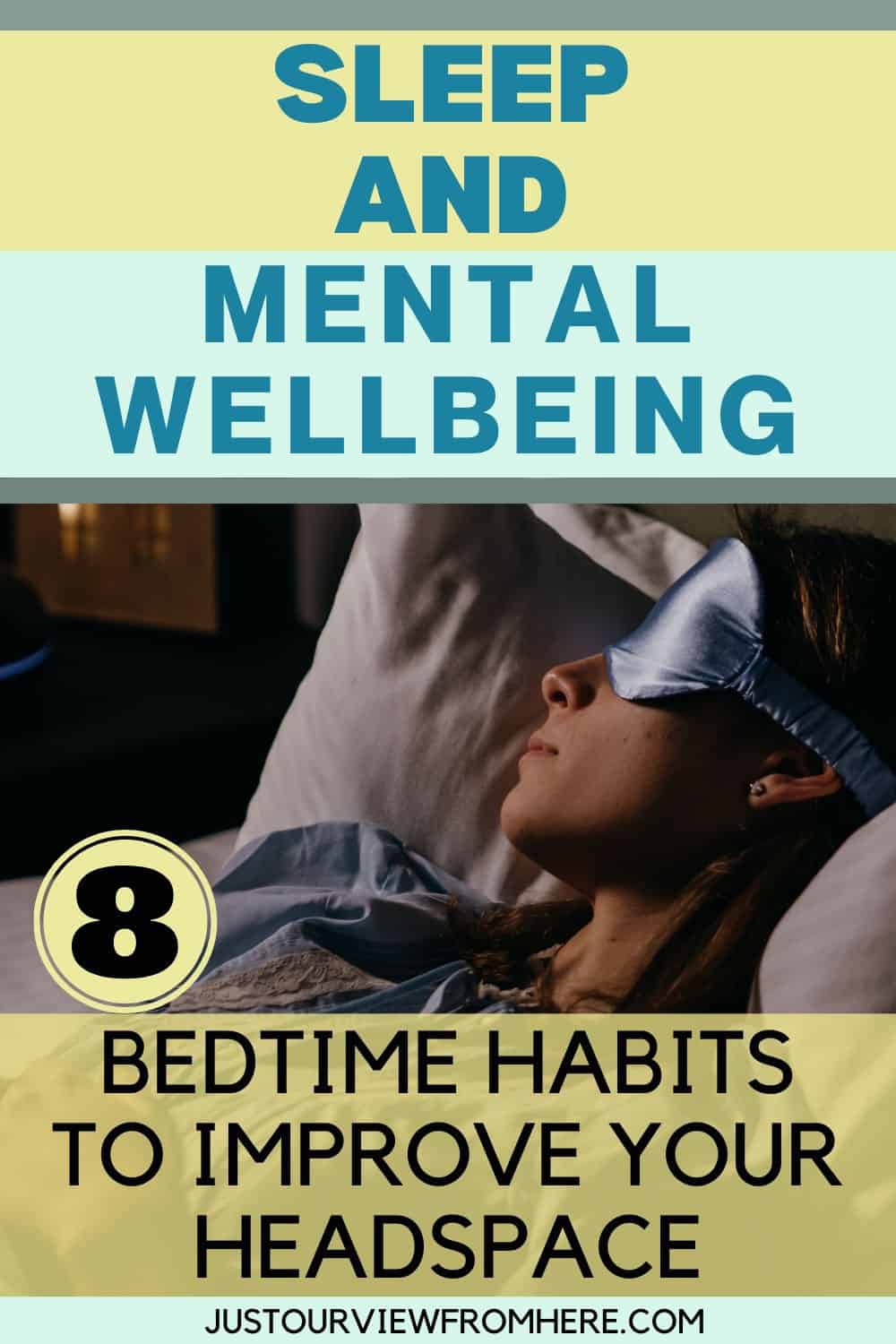Guest Post by Emily
Tired of waking up feeling exhausted and spending the rest of your day miserable? In this article, we’ll explore how just a few simple changes in your sleep hygiene and bedtime routines can supercharge your mental health – leaving you feeling refreshed, focused, and ready to conquer the world!

How much sleep do adults need?
Most of us are aware that a good night’s sleep is critical for optimal brain function – if you find yourself tossing and turning or counting sheep, chances are you’ll be feeling groggy and unenergized the following day.
Your brain goes through several stages of sleep during the night, including light stages of sleep, deep sleep and REM sleep.
These sleep stages help maintain normal cognitive function while performing other restorative processes that support the brain and body.
Physical and mental symptoms of poor sleep
So, how do you know when you’re not getting the sleep you need? Some tell-tale signs include:
- Difficulty concentrating
- Needing to nap during the day
- Finding it hard to take on and remember new information
- Experiencing drowsiness or fatigue
- Falling asleep as soon as your head hits the pillow
- Relying on an alarm clock to wake up
If you’re repeatedly waking up exhausted or suffering from insomnia, talk to your health provider to rule out other underlying causes.
How does poor sleep relate to mental health?
Suffering from poor sleep can form a problematic cycle, where the lack of sleep leads to mental health symptoms such as chronic stress and anxiety, and those mental issues can, in turn, cause substandard sleep.

8 Ways To Boost Mental Health Through Better Sleep Hygiene
With that said, if your sleeping issues are down to poor sleep hygiene and stress (without a significant root cause), there are a few things you can try:
- Go to sleep and wake up at the same time
One of the most important things you can do to ensure you are getting a good night’s rest is to go to bed and wake up at the same time each day.
Whilst this might not seem that important, our brains are creatures of habit that rely on a 24hr internal clock to regulate sleep and waking hormones.
The circadian rhythm has been shown to directly relate to mood & mental health, highlighting the importance of helping your brain to regulate its sleep-wake cycle.
Not only can this step help your circadian rhythm, but ensuring you have a steady daily routine can be effective in positively impacting mental well-being.
- Write in a daily journal
We’ve already discussed how stress can impact your sleep, and for those of us that lay awake at night thinking of all the things we need to do or worry about, writing these thoughts in a journal before bed can put a stop to endless rumination.
An hour or two before you go to bed, take time for yourself to write down your worries or to-do list in a notebook.
Once the book is shut, allow your mind to settle down and unlatch from the day’s events.
Writing in a journal can also help boost mental well-being, identifying stressors and giving you additional clarity on your thoughts and feelings whilst working through them in a healthy way.
- Try mindfulness and meditation
Mindfulness and meditation techniques can help to break down stress and relax the body, making it easier to get a restorative night’s sleep.
There are no strict rules when it comes to techniques, and it’s ultimately down to what each individual finds useful. You could try:
- Group meditation classes
- Meditating using an app or audiobook
- Gentle exercise such as yoga
- Taking set time alone for mindfulness
- Practising mindfulness during the day
Mindfulness is also particularly beneficial when it comes to mental health as it can help you view thoughts and emotions differently, reducing their impact and making it easier to cope with stress.
It is important to remember that these techniques should be used over time to better equip you with the tools you need to relax, as opposed to becoming reliant on a sleep-meditation app to get you to sleep.
- Limit daytime napping
It can be extremely tempting to nap during the day if you’re suffering from poor sleep, but unfortunately, this can compound the problem and make it worse.
Daytime napping can quickly become a habit that disturbs your sleep-wake cycle – and your daily routine.
Try to avoid daytime naps in conjunction with consistently going to bed and waking up at the same time each day and you should, over time, see improvements.
If you cannot cut the naps out immediately, try cutting them down to 30 minutes at first, and then gradually reduce their duration.
For those severely tired during the day to the point they cannot avoid naps, it’s important to seek medical advice as it may be linked to conditions such as an overactive thyroid or sleep apnea.
- Ditch tech before bed
The body’s circadian rhythm relies on various environmental cues for regulation, and one of these cues is light.
That means that blue light emitted from screens such as laptops, TVs and phones can be interpreted by the brain as daylight, in turn keeping you awake.
Using your phone before bed can also raise stress, as social media algorithms often show you content or news designed to trigger negative feelings and fear, as this content gets a lot of engagement.
So, do your mental well-being and sleep a favor – avoid using technology for at least two hours before bedtime.
If you have to look at your phone, use the blue light-blocking setting to reduce the negative impact.

Related: Screen Time Before Bed & What To Do Instead
- Create a wind-down routine
Creating the foundation for a good night’s sleep begins hours before you go to bed.
If your day is filled with unmanaged stress and you’re spending time on your phone right before your head hits the pillow, it can be a recipe for disaster.
As part of your new sleep routine, you should plan anywhere from 30 minutes to 3 hours of wind-down time before you go to sleep.
This could include taking a warm bath, gentle stretching, practising self-care, meditating or reading a book.
Be realistic with your target and choose an amount of time that is achievable, and guard this time for yourself every day.
- Improve your sleep environment
In the modern age, the use of bedrooms as entertainment zones, offices or study spaces is becoming increasingly common – which can unfortunately have a significant impact on a good night’s rest.
If your brain associates your bedroom with work or study, it can be harder to switch off at the end of the day.
This combined with other factors in the set-up of a bedroom environment can make it difficult to drift off into a restful slumber. To improve it, you can try to:
- Separate work, entertainment and study spaces from the rest of the room
- Makes sure that your bedroom is clean and free from dust, allergens and clutter
- Reduce noise and distractions such as traffic outside or pets moving around
- Ensure your mattress is comfortable, supportive and free of allergens
- Maintain a regular, cool temperature throughout the night
- Reduce any light, whether from technology standby lights or daylight leaking in
Your bedroom should be your sanctuary dedicated to sleep, so ask yourself what could be causing a distraction that pulls you away from rest – whether sound, light, temperature or old uncomfortable pillows.
- Speak to a therapist
As with mental health in general, it can often be difficult to pinpoint the causes of bad sleep in relation to feelings of low energy, stress and even depression.
Sitting down with a therapist or counsellor can help to start unravelling feelings and beliefs that keep you stuck in a poor sleep > poor mental health cycle.
Now you know how prioritizing sleep hygiene through consistent routines, stress management techniques and seeking professional support can have a profound impact on mental health and overall well-being.
more articles for you to enjoy:
6 Types Of Self-Care Beyond The Bubble Bath
The Absolute Best Essential Oils For Calming & Relaxation
Affirmations For Self-Love: Boost Your Confidence
Empowering Your Journey with Positive Affirmations for Self-Love” Have you ever found yourself in a…
Audiobooks Vs. Reading Books In Print: Pros & Cons Of Each
are audiobooks as good as reading? Exploring the Never-Ending Battle Between Audiobooks Vs. Traditional Reading…
Screen Time Before Bed And What To Do Instead
Kick The Smartphone Habit With These 11 Alternatives To Screen Time Before Bed Most of…




